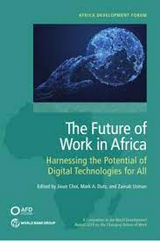
Human Capital
Blimpo, Moussa P. / Solomon OwusuExternal Publications (2020)
in: Jieun Choi / Mark A. Dutz / Zainab Usman, The future of work in Africa: harnessing the potential of digital technologies for all, Washington: World Bank,
ISBN: 978-1-4648-1444-0
DOI: https://doi.org/10.1596/978-1-4648-1444-0_ch2
Open access
Explains why the unique nature of the skills, labor force, jobs, and production structure of Sub-Saharan African countries makes investment in human capital a key priority for better preparing the African labor force for the opportunities made possible by digital technologies. The growing potential of digital technologies as learning and health delivery tools means that many jobs, especially low-skill production and health service delivery jobs, may not necessarily require more advanced cognitive skills at the entry level; instead, digital technologies, together with analog complements, can compensate for lower skills. Relative to other regions, Sub-Saharan Africa has the fastest-growing labor force yet the lowest levels of human capital and the largest stock of ill-equipped adults. The informal sector remains large and persistent; non-tradable services often associated with high levels of informality, low-paid jobs, and low-skilled and low-productivity tasks have grown rapidly. Using digital technologies to improve the productivity of the massive workforce absorbed in these sectors should be given priority.
